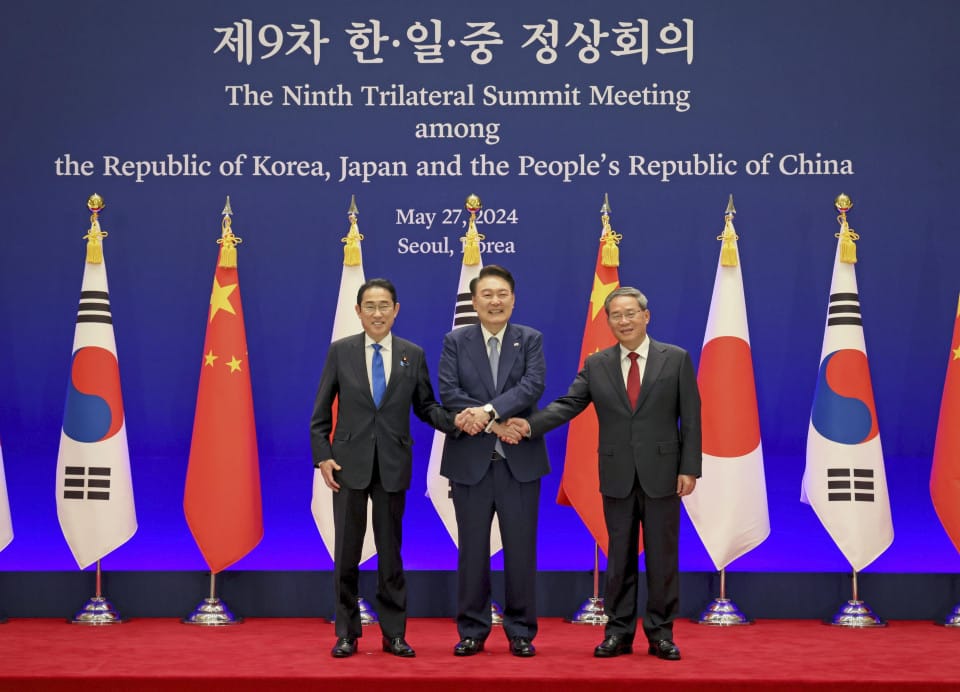Korea-China-Japan Summit, President Yoon's Vetos, Record Low Fertility
Korea-China-Japan Summit Outcomes and Significance, President Yoon's Unprecedented Veto Spree, South Korea's Record Low Fertility Crisis

Korea-China-Japan Summit Outcomes and Significance
The long-awaited Korea-China-Japan Summit finally took place in Seoul last weekend, marking the first trilateral meeting among the countries' leaders since 2019. The summit, while failing to deliver major breakthroughs on the most sensitive regional security issues, succeeded in putting the vital trilateral cooperation process back on track after years of COVID-19 disruptions and intensifying strategic rivalries. The joint declaration adopted by President Yoon Seok-yeol, Chinese Premier Li Qiang, and Japanese Prime Minister Fumio Kishida outlined a wide-ranging agenda to expand economic links, people-to-people exchanges, and functional cooperation on transnational challenges like climate change and counter-terrorism. Notably, the three sides agreed to regularize the trilateral summit process, building habits of high-level dialogue to manage frictions in an era of rising geopolitical tensions.
On the economic front, accelerating negotiations on the long-stalled trilateral free trade agreement emerged as a priority, reflecting the three countries' shared interest in deepening regional economic integration. The leaders also pledged to strengthen supply chain cooperation, a key concern amid US-China trade frictions and pandemic-induced disruptions that have exposed the risks of overreliance on any single production source. China, facing escalating US export controls and "de-risking" pressure on its economic partners, has stepped up economic diplomacy with neighbors like Korea and Japan, dangling the prospects of expanded market access and trade opportunities. While Seoul and Tokyo are keen to restore economic ties with Beijing to drive growth, structural dependencies on the US alliance and growing calls in Washington for "economic security" measures to counter China limit how far this rapprochement can go. Still, advancing the trilateral FTA and supply chain talks could help insulate regional economic cooperation from the shocks of US-China strategic competition to some degree.
In the sociocultural sphere, the three leaders set an ambitious target of increasing annual people-to-people exchanges to 40 million by 2030. Such grassroots interactions have long been seen as essential to overcoming historical animosities and building a sense of shared Northeast Asian community. Extensive cooperation was also agreed in areas like climate change, marine conservation, plastic pollution, and disaster management, highlighting the indispensable role of the three countries in addressing regional and global governance challenges. The joint declaration further noted plans to share experiences on the common demographic tests of rapidly aging populations and plummeting birth rates. Such functional cooperation in both traditional and non-traditional domains can generate more resilient habits of cooperation and positive linkages among the three neighbors even when geopolitical tensions flare.
However, the summit also laid bare the still formidable gaps on the most nettlesome regional security issues, especially North Korea's advancing nuclear program. The joint declaration adopted compromise language "reaffirming" each country's existing position on Korean Peninsula denuclearization, a notable climb-down from the 2019 summit's commitment to "complete denuclearization." President Yoon and Prime Minister Kishida both strongly emphasized the importance of denuclearization and full enforcement of UN sanctions on Pyongyang. But the Chinese Premier avoided explicitly calling for denuclearization, instead highlighting the need for dialogue and restraint by all parties to prevent tensions from spiraling. Beijing's shift reflects its assessment that the US and allies are ramping up military cooperation in the name of the North Korea threat but aimed at containing China's rise as well. China's diplomatic and economic lifeline remains indispensable to keeping the Kim regime afloat, and thus Chinese leaders are loath to seriously pressure Pyongyang in ways that could diminish this leverage vis-a-vis the US
Similarly, little substantive agreement was reached on other flashpoints like Taiwan or regional maritime disputes, with the summit skirting the sharpest edges of division to focus on areas of relative consensus. While this lack of headline-grabbing outcomes led some observers to dismiss the summit as more style than substance, keeping the trilateral channel open for leader-level dialogue retains strategic significance even without solving the thorniest problems. In an increasingly polarized regional landscape, such leader-led frameworks are essential safety valves to keep misunderstandings or provocations from escalating to catastrophic conflicts. The summit's greatest deliverable was institutionalizing a regularized process rather than any specific deal.
To be sure, trilateral cooperation still faces challenges, with the hardening US-China rivalry and intensifying Sino-Japanese frictions over Taiwan and the East China Sea creating a minefield for Seoul's "balanced diplomacy." Pyongyang's provocative nuclear and missile tests are sure to keep driving tensions and divisions among the three. In the end, the Korea-China-Japan triangle is simply too consequential - economically, geopolitically, and culturally - for any side to abandon.
President Yoon's Unprecedented Veto Spree
President Yoon Seok-yeol is rewriting the history books with his liberal use of the presidential veto, rejecting a record-shattering ten bills passed by the opposition-controlled National Assembly in just his first two years in office. The flurry of vetoes, all issued since Yoon took power in May 2022, far surpasses the previous record of seven under President Roh Tae-woo in the early years of Korea's democratic transition. Most presidents since the 1987 reforms have used the veto power sparingly if at all, seeking to avoid open clashes with the legislature. But Yoon has shown no such reticence, wielding the red pen with abandon in the face of an emboldened opposition that has pledged to check his power at every turn.